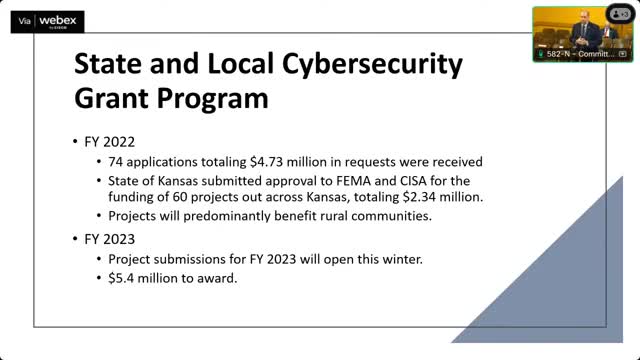Kansas Launches Innovative Cybersecurity Training for Water Systems
September 26, 2024 | Joint Committee on Information Technology, Joint, Committees, Legislative, Kansas
This article was created by AI summarizing key points discussed. AI makes mistakes, so for full details and context, please refer to the video of the full meeting. Please report any errors so we can fix them. Report an error »

In a recent government meeting, officials discussed the rollout of the state and local cybersecurity grant program established under the Infrastructure Investment and Jobs Act (IIJA). The program, which mirrors the Homeland Security Grant Program, has seen significant interest, with 74 applications submitted for approximately $4.73 million in funding. However, only $2.23 million was available for distribution in the first fiscal year, resulting in the approval of 60 projects.
The state has a four-year window to allocate and utilize these funds, with the first fiscal year focusing on developing a statewide cybersecurity plan. Applications for the upcoming fiscal year 2023 will open in January, with an available budget of $5.4 million, which requires a 20% cost match from local governments. Officials noted that many states are using these funds to provide cybersecurity services to local governments at reduced or no cost, although Kansas is currently issuing funds directly rather than offering services.
Additionally, the meeting highlighted ongoing efforts to address cybersecurity challenges in water and wastewater systems. Following a 2021 memorandum from the Environmental Protection Agency, the state initiated a partnership with the Kansas Department of Health and Environment (KDHE) and the Department of Homeland Security's Cybersecurity and Infrastructure Security Agency (DHS CISA) to develop a training program for water operators. This initiative aims to enhance cybersecurity measures across approximately 900 water systems in Kansas, many of which serve rural populations.
Kansas has already conducted nine training sessions this year, positioning itself as a leader in developing comprehensive cybersecurity training for water operators. The program has garnered recognition from organizations such as the National Governors Association and has received awards from state IT news outlets, showcasing the state's innovative approach to cybersecurity in critical infrastructure.
The state has a four-year window to allocate and utilize these funds, with the first fiscal year focusing on developing a statewide cybersecurity plan. Applications for the upcoming fiscal year 2023 will open in January, with an available budget of $5.4 million, which requires a 20% cost match from local governments. Officials noted that many states are using these funds to provide cybersecurity services to local governments at reduced or no cost, although Kansas is currently issuing funds directly rather than offering services.
Additionally, the meeting highlighted ongoing efforts to address cybersecurity challenges in water and wastewater systems. Following a 2021 memorandum from the Environmental Protection Agency, the state initiated a partnership with the Kansas Department of Health and Environment (KDHE) and the Department of Homeland Security's Cybersecurity and Infrastructure Security Agency (DHS CISA) to develop a training program for water operators. This initiative aims to enhance cybersecurity measures across approximately 900 water systems in Kansas, many of which serve rural populations.
Kansas has already conducted nine training sessions this year, positioning itself as a leader in developing comprehensive cybersecurity training for water operators. The program has garnered recognition from organizations such as the National Governors Association and has received awards from state IT news outlets, showcasing the state's innovative approach to cybersecurity in critical infrastructure.
View full meeting
This article is based on a recent meeting—watch the full video and explore the complete transcript for deeper insights into the discussion.
View full meeting
